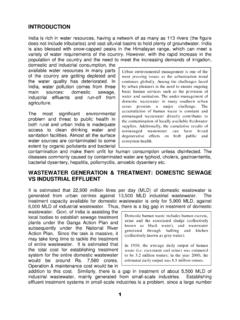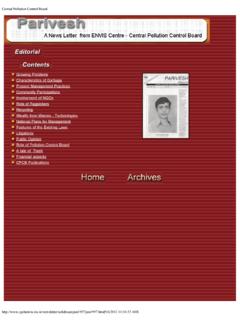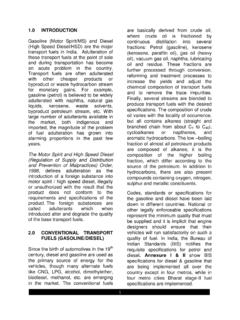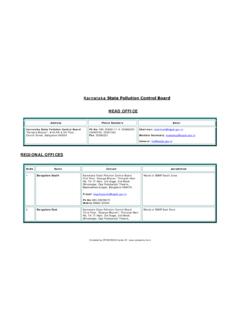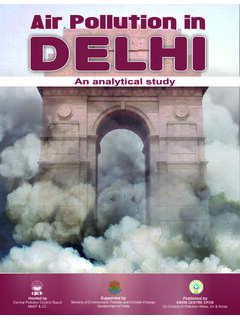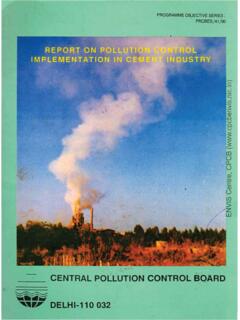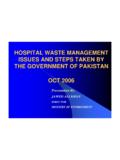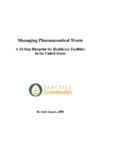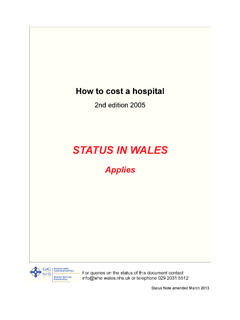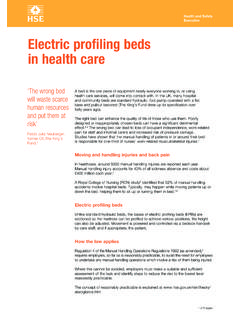Transcription of Central Pollution Control Board - CPCB ENVIS
1 Central Pollution Control [9/6/2012 11:03:04 AM] MessageLegislation for management of HW and cetegorisation of HWTrans-boundary Transfer of hazardous Waster : Issue and OptionHazardous Wastes Generation in IndiaAction Points for Strengthening HWMG uidelines for setting up of hazardous waste management facilitiesGuidelines for Ship-breaking IndustryWorld Bank - assisted project on hazardous waste ManagementIndo-German Bilateral Project on hazardous waste managementReady Reckoner for Processing Application for authorisationEnvironmentally - sound management for Re-Processing of ZincAsh/ Skimming, Lead waste , Waster OilCPCB Publications on hazardous WastesCentral Pollution Control [9/6/2012 11:03.]
2 05 AM] Contents Archives HomeThe hazardous wastes belong to a category of special wastes containing certain chemicals,metals and pathogenic organisms which can cause damage to the environment even at lowconcentration. If not properly managed for safe disposal, it can have frighteningenvironmental repercussions. Indiscriminate disposal of these wastes into the environmentwithout proper treatment could lead to Pollution of river water, land and measure are required for handling of hazardous wastes generated within thecountry from different sources as well as though import other countries for recovery ofuseful materials.
3 Recognising the need for proper management and handling of hazardouswastes, the regulations in this regard under the Environment (Protection) Act 1986 havebeen notified by the Ministry of environment & Forest, Govt, of India (1989). At theinternational level, the concern for restricting transboundary movement of hazardouswastes is reflected in the Basel Convention (1989) and subsequent follow-up recent years, some important steps have been initiated for hazardous wastesmanagement. These relate to 1. Harmonisation of domestic legislation with the decision of the Basel Convention;2.
4 Programme for setting up of hazardous waste treatment and disposal facilities inindustrial estates;3. Setting up of a National Centre for cleaner Technology/Production with its sub-centres in different States;4. Co-ordination with Customs & Port authorities to ensure strict Control over themovements of hazardous wastes across the international borders and the preventionof illegal trafficking;5. Strengthening the capability of Central and State Pollution Control Boards forregulation, management and handling of hazardous wastes; and6. Setting up of a Sub-regional Training Centre at New this issue of Parivesh, we have made an attempt to highlight the various technical andadministrative issues concerning hazardous waste management .
5 We hope, the informationcontained in this newsletter will be useful to the readers. (Dilip Biswas)Chairman, CPCBC entral Pollution Control [9/6/2012 11:03:06 AM] hazardous waste MANAGEMENTM essage :For the future generations, it is essential that we preserve natural resources and prevent environmental attain this goal, development has to be sustainable. The Government and various other organizations are doingtheir bit for Pollution prevention. However, the battle cannot be fought without effective public awareness the object to creating awareness among the people, the Central Pollution Board (CPCB) brings out publicationon various aspects of Pollution -its sources, effects, and consequences, prevention and Control .
6 Among thispublication, the CPCB newsletter, 'PARIVESH' requires special mention. Every issue of 'PARIVESH' centers around atheme, like vehicular Pollution , hospital wastes, municipal solid wastes, and noise Pollution , coastal Pollution , propersitting of industries through Zoning Atlas etcThis issue highlights the problem of hazardous wastes- on undesired by-product of various industrial operations andprocesses. Its trans boundary movement for disposal/dumping in underdeveloped countries in the guise of recyclingand reuse have attracted the attention of the media and public all over the world.
7 We are far behind in theabatement of such kind of Pollution . Our judiciary has also taken the matter seriously. Guidelines and specificationshave been evolved by the Ministry of Environment & Forests for prevention and Control of Pollution for such wastethrough better management practices. CPCB has prepared State wise inventory of hazardous waste generation andalso published a document on setting up of Control facilities for management of such wastes. The society needsproper implementation of such practices so as to make its disposal safe to environment.
8 (BABU LAL MARANDI)Back to ContentCentral Pollution Control [9/6/2012 11:03:07 AM] hazardous waste MANAGEMENTLEGISLATION FOR management OF hazardous waste AND CATEGORISATION OF HAZARDOUSWASTE :In exercise of the power conferred under the Environment (Protection) Act, 1986 (29 of 1986), the CentralGovernment has made the hazardous waste ( management & Handling) Rules, 1989 and published in the officialGazette (E), dated these Rules define the hazardous Wastes and provide specific schedule inwhich wastes are listed for application of the rules.
9 The occupier generating hazardous waste has obligation to takeall practical steps to ensure that such wastes are properly handled and disposed off without any adverse effect,which may result from such wastes. The occupier shall also be responsible for proper collection, transportation,treatment, and storage and disposal of these wastes either by himself or through the operator of a facility. Theoccupier shall submit application to the State Pollution Control Board (SPCB) for grant of authorization for handling ofhazardous wastes. The SPCB shall not issue an authorization unless it is satisfied that the operator of a facility or anoccupier as the case may be, possesses appropriate facilities, technical capabilities and equipment t handlehazardous wastes safely.
10 The State Administration, or a person authorized by it is required to undertake a continuing programme toidentify the sits and compile and publish periodically an inventory of disposal sites within the STATE/UT for thedisposal of hazardous wastes. An environmental impact study shall be undertaken before final identification of a siteas waste disposal site. Import of hazardous waste from any country to India Shall not be permitted for dumping anddisposal of such wastes. However, import of such wastes may be allowed for processing of or re-use as rew-material,after examining each case on merit by the SPCB or by an officer authorized in this hazardous Wastes ( management & Handling) Rules apply to the categories of hazardous Wastes as specified inthe Schedule provided in Table 1 [See rules 3(1), 3(n)]

